Newsletter 2024/3
Newsletter 2024/3 - December 2024
Introduction
As we near the close of another eventful year, I am pleased to share with you some of the highlights of the Tribunal’s recent activities. Over the past months, I have had the privilege of representing the Tribunal at several conferences and fora across the globe, many of them marking the thirtieth anniversary of the entry into force of the United Nations Convention on the Law of the Sea. These engagements have provided invaluable opportunities to underscore the crucial role of the Tribunal in upholding the legal order established under the Convention.
One key focus of my presentations has been the Tribunal’s Advisory Opinion in the Request for an Advisory Opinion submitted by the Commission of Small Island States on Climate Change and International Law, which has garnered significant attention among States, scholars and practitioners alike. The Opinion reflects the steadfast commitment of the Tribunal to addressing contemporary challenges facing the international community including, in this case, the deleterious effects climate change has on the marine environment and the devastating consequences on small island States. By clarifying legal issues related to the purposes of the Convention and promoting the peaceful settlement of disputes, the Tribunal continues to strengthen the framework for sustainable ocean governance. I am deeply encouraged by the dialogues and collaborations that emerged during these engagements. From academic discussions to exchanges with government officials, the widespread interest in the work of the Tribunal reaffirms its importance in the interpretation of the Convention and in shaping the future of the law of the sea.
As far as the capacity-building work of the Tribunal goes, I am happy to report that plans are underway to hold a number of workshops in 2025, which will further strengthen knowledge-sharing and foster greater understanding of the Tribunal’s work, in particular among developing countries and regions most affected by law of the sea related challenges.
I hope that you enjoy reading this newsletter.
With my warmest regards,
Tomas Heidar
President
ITLOS Cases
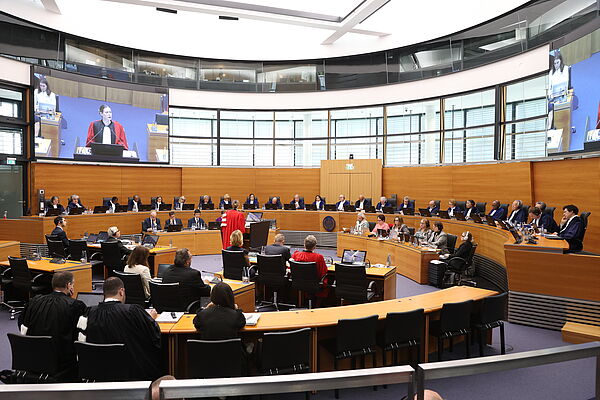
Case No. 32: The M/T “Heroic Idun” (No. 2) Case (Marshall Islands/Equatorial Guinea)
In accordance with the Order of the President of the Special Chamber of 25 July 2024, the second round of written pleadings is ongoing, with the Rejoinder of Equatorial Guinea expected by 24 March 2025.
Case No. 33: The “Zheng He” Case (Luxembourg v. Mexico)
Pursuant to Order 2024/3 of 8 August 2024, the Memorial of Luxembourg is expected by 10 February 2025 and the Counter-Memorial of Mexico is expected by 11 August 2025.
Interview with Judge Joyini (South Africa)
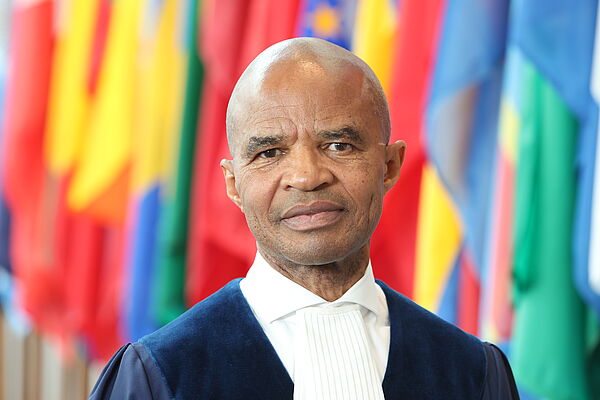
Elected in June 2023, you are one of the most recently elected members of the Tribunal. What inspired you to pursue a career in international law, and how did that journey lead you to become a judge at the Tribunal?
I am indeed one of the most recently elected members of the Tribunal. I was elected on 14 June 2023 at the United Nations Headquarters in New York and sworn in, with the other new members, at a ceremony that took place on 2 October 2023 at the Tribunal in Hamburg, Germany.
I was inspired to pursue a career in international law by the team of lawyers in the Office of the Chief State Law Adviser (International Law), which is the Legal Section of the Foreign Ministry in South Africa. As I really wanted to join this team of international lawyers, I studied international law and graduated with an LLM in 2007 from the University of South Africa. The following year, in 2008, I joined the Legal Section where I focused more on oceans and law of the sea issues.
This was the beginning of the journey that led me to become a judge at the Tribunal. However, I was not initially sure about becoming a judge until something very unexpected happened to me: I was invited to serve as a judge of the High Court of South Africa in Pretoria in 2019. This was an eye-opener. I enjoyed being a judge; therefore, it was very difficult for me to leave the judiciary at the end of my stint. It was also very difficult to readjust to my work in the Legal Section. That is when I realized that being a judge was a calling for me and it was what I wanted to be in life. Since then, I have never looked back. It became clear that the seed was planted and it was just a matter of time before I would become a judge.
Before becoming a judge, you were the Head of the South African delegation at the International Seabed Authority and are currently a member of the Seabed Disputes Chamber of the Tribunal. From your experience, what role do you foresee for the Seabed Disputes Chamber in the future?
As the Head of the South African delegation at the International Seabed Authority (ISA or Authority), I was exposed to quite a number of issues. I was also the Vice-Chairperson of the ISA Legal and Technical Commission. Additionally, I participated in the ISA Council and Assembly meetings as Coordinator of the African Group. I likewise negotiated, on behalf of the African Group, the financial payment mechanisms, which is one of the chapters of the Draft Mining Code.
I am also currently a member of the Seabed Disputes Chamber. The Seabed Disputes Chamber is entrusted, through its contentious and advisory jurisdiction, “with the exclusive function of interpreting Part XI of the Convention and the relevant annexes and regulations”. As you may recall, on 1 February 2011, the Seabed Disputes Chamber (“the Chamber”) delivered its first Advisory Opinion relating to the obligation of sponsoring States.
The deep-seabed mining sector and its operations around the world may become a reality very soon once the pending Exploitation Regulations in the form of a Mining Code are put in place by the International Seabed Authority. Once deep-seabed mining starts, there is a possibility that there might be disputes requiring the attention of the Seabed Disputes Chamber. Article 187 of the UNCLOS confers broad jurisdiction upon the Seabed Disputes Chamber of the International Tribunal for the Law of the Sea over disputes arising from activities in the Area which includes the international seabed area. Therefore, I foresee a very important role for the Seabed Disputes Chamber of the Tribunal in the future.
In the past year, the international community has celebrated the thirtieth anniversary of the entry into force of the Convention. What opportunities and challenges do you see for the Tribunal in its ongoing role to adjudicate disputes, in particular those involving African States, arising out of the interpretation and application of the Convention?
The enormous number of boundary disputes in Africa represents a major challenge, as do weak legal regimes and poor implementation of existing legal frameworks. Other obstacles include the lack of preparedness of African States to acknowledge and subsequently confront the maritime challenges and threats facing them; overdependence on oil, which has brought in powerful foreign companies that are often very difficult to regulate; and inadequate capacity to develop and enforce sufficient regulation. The unstable and fragile political regimes of many coastal African States compound the problems hindering the management of their maritime areas. Criminal and illegal maritime operations affect not only continental States but also Africa’s island States. Some of these issues have the potential to escalate into disputes that may be referred to the Tribunal in future.
What advice do you have for young African diplomats and scholars interested in the law of the sea?
I would like to advise young African diplomats and scholars interested in the law of the sea to take advantage of the opportunities provided by ITLOS, namely, the internship programme, the ITLOS-Nippon Foundation capacity-building and training programme on dispute settlement, and the summer academy sponsored by the International Foundation for the Law of the Sea.
I would encourage them to make important contributions to the advancement of the rule of law governing the seas and oceans, and to expand the caliber of their input by taking advantage of the opportunities referred to above.
Lastly, I would urge them to continue developing their interest in the law of the sea, have active and vigorous discussions, and be the cornerstone for peace and stability in matters concerning the seas and oceans.
ITLOS conferences and events
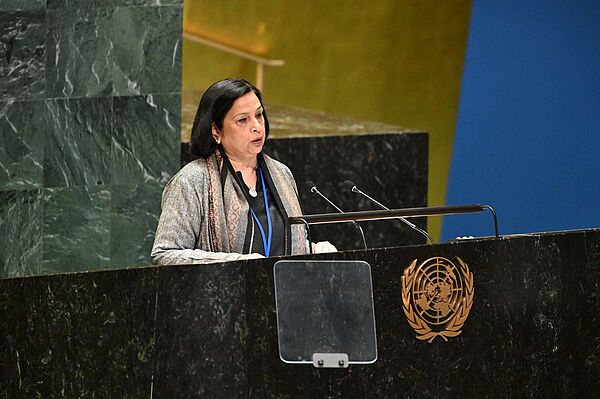
The third ITLOS Workshop for Legal Advisers (sponsored by the Republic of Korea) was successfully concluded in September. The workshop was specifically designed for legal advisers of Latin American and Caribbean States, and included presentations by President Heidar, Vice-President Chadha, Judges Cabello Sarubbi, Infante Caffi, Brown, Armas Pfirter and Rhee, and Registrar Hinrichs Oyarce.
President Heidar and Judges Infante Caffi, Caracciolo, Rhee and Kamara participated in the 9th International Conference on the Law of the Sea, “30 Years of UNCLOS: Then, Now, and the Future”, co-organized by ITLOS and the Ministry of Foreign Affairs of Korea in Seoul in November.
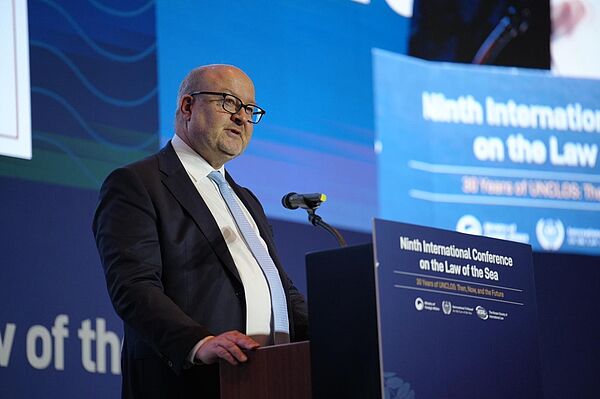
Over the course of the last few months, President Heidar has given various keynotes and presentations, including at the H2OLAW Conference at the University of Leiden on “Law-Science Interfaces within the Law of the Sea and Fresh Water Law”; on “The Law of the Sea Convention as a Living Instrument: The ITLOS Advisory Opinion on Climate Change” at the NCLOS Annual Conference in Trømso; on “The Role of ITLOS in the Development of the International Law of the Sea” at the inaugural session of the Colombian Law of the Sea Institute in Bogotá; on the recent jurisprudence of ITLOS on his visit to the Philippines at the University of the Philippines, the Climate Change Commission, the Office of the Solicitor-General and the Department of Foreign Affairs of the Philippines; on “The Contribution of ITLOS to the Development of International Law: From ‘a Ship as a Unit’ to the Continental Shelf and Climate Change” as part of the Centre for International Law Distinguished Lecture Series in Singapore; and on the ITLOS Advisory Opinion on Climate Change and other recent jurisprudence at the 2024 Symposium on International Maritime Dispute Settlement and International Law, and at a related training workshop as well as at Peking University in Beijing.
On 12 December, Vice-President Chadha addressed the plenary of the seventy-ninth session of the United Nations General Assembly during its consideration of agenda item 75(a) “Oceans and the law of the sea”.
Capacity building
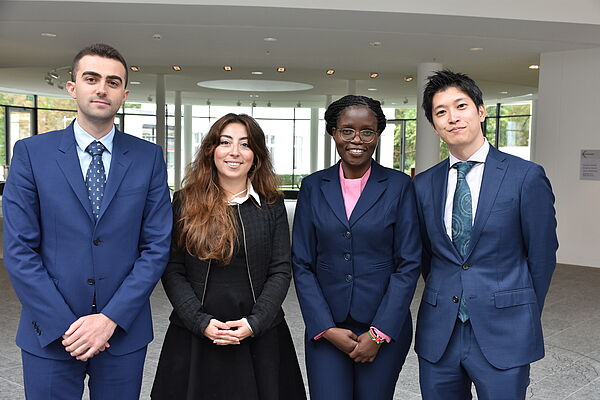
In October, Ms Emmah Akware (Kenya), Ms Laura Forero Orozco (Colombia), Mr Buen Hoti (Albania), and Mr Kei Sugimoto (Japan) started their internships in the Legal Office. In the coming days, the interns will be presenting their respective research papers dedicated to “Grey Areas in the Continental Shelf beyond 200 nautical miles in the Indian Ocean: Analysing cooperation mechanisms”; “Rules, Regulations, and Remedies: Discussing the Future of the ITLOS Climate Advisory Opinion”; “The Obligation to Render Assistance at Sea under UNCLOS and IMO Conventions”; and “The Fukushima Nuclear Water Release: What Does the Law of the Sea Offer for Land-Based Pollution by Nuclear Substances?”.
The six fellows (Keneilwe Chakalisa (Botswana), Ibrahim Abdu Mohammed (Eritrea), Anita Rayegani (Hungary/Canada), Yousef Salah (Libya), Perumal Thulasidhass (India), and Khawla Wakkaf (Syria)), who are already halfway through the nine-month ITLOS-Nippon Foundation Capacity-Building and Training Programme on Dispute Settlement under UNCLOS, are currently following an intensive course of lectures and workshops with recent lectures given on the “Delimitation of the Continental Shelf beyond 200 nm”; “Responsibility, Liability and Compensation for Environmental Damage”; and “The Legal Regime of the Area”. In addition to their regular lectures, the fellows have enjoyed study visits to the Max Planck Foundation for International Peace and the Rule of Law in Heidelberg, the International Court of Justice and the European Commission.
Meet the ITLOS Alumni
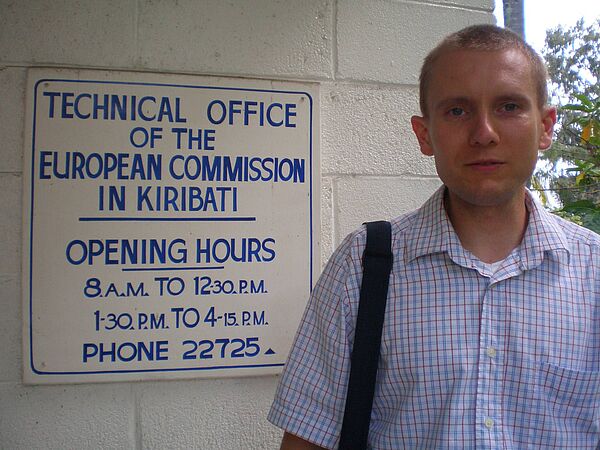
Bernard Blazkiewicz, Legal Officer, European Commission, Directorate-General for Maritime Affairs and Fisheries (Unit B.2 Regional Fisheries Management Organisations)
It took me some time to recall my internship at the Tribunal as it took place in the twentieth century, when the seat of ITLOS was in central Hamburg, and only some people owned mobile phones (and not smartphones).
I consider my internship at ITLOS pivotal to my professional legal career. When I arrived at ITLOS, I was in the middle of writing my Master’s thesis in maritime law at the University of Gdaǹsk on the topic of bills of lading in English law. My plan was to take advantage of the well-stocked ITLOS library, excellently managed by Ellen Schaffer. Coincidentally, on the first day of the internship, Australia and New Zealand had submitted a request for provisional measures, which became Southern Bluefin Tuna Cases Nos. 3 and 4. These cases kept me very busy for the rest of my stay, well beyond my research on bills of lading.
The Tribunal held public hearings for Cases Nos. 3 and 4, presided by the late Judge Thomas Mensah. I was supporting judges by conducting legal research on provisional measures at international courts and on the precautionary approach/principle in the law of the sea. At that time, I came across the concepts of maximum sustainable yield and BLIM (biomass limit reference point). I saw how mathematical models and natural science could shape the application of law. This interaction between science and law is the bread and butter of my current work at the European Commission, DG MARE.
Following my internship, I developed a keen interest in the law of the sea, moving away from maritime law. I attended related summer courses at the Rhodes Academy of the Law of the Sea in Greece and at the International Ocean Institute in Canada. In 2002-2004, I was enrolled in a postgraduate LLM programme at Dalhousie University in Canada, focusing on the Northwest Atlantic Fisheries Organization and fisheries enforcement. During my stay in Canada, I also delivered training on the law of the sea, organized by the International Ocean Institute (IOI) for developing countries. At that time, I had the pleasure of working with the late Elisabeth Mann Borgese, the IOI founder. Following my postgraduate studies, I spent several months as a researcher at the World Conservation Union’s Legal Office in Bonn, focusing on deep seabed genetic resources. After I was admitted to the bar in Poland, I worked for a while in a corporate law firm.
Still, I felt the call of ocean affairs. In 2006, I joined the diplomatic service of the European Commission, working in the EU Delegation for the Pacific, based in Suva, Fiji. I was in charge of European Union regional programmes for the Pacific related to the marine sector and, in particular, of strengthening of the effectiveness of regional fisheries (Western Central Pacific Fisheries Commission). I later worked in Brussels in the Legal Unit for the European Neighbourhood Policy and Enlargement Negotiations Directorate, dealing with various legal issues related to the EU’s external policies.
In 2017, I “returned” to the law of the sea, joining DG MARE, where I still work. I work on the application of the law of the sea in RFMOs (regional fisheries management organisations) Unit. I am involved in the external representation of the European Union at RFMOs. This includes negotiating conservation and management measures as well as supervising RFMOs’ secretariats. I also draft EU legislation transposing RFMOs’ international obligations into EU law. This entails collaborating with the EU’s co-legislators, the European Parliament and the Council, until publication of the laws in the Official Journal.
Even after so many years of experience in ocean affairs, I am still puzzled and perplexed by the interaction between science, law and human behaviour at sea. I am quite pleased that my ITLOS internship put me on the path of such exciting topics.
Upcoming events
- The Tribunal’s Fifty-ninth Session will take place from 31 March to 11 April 2025.

